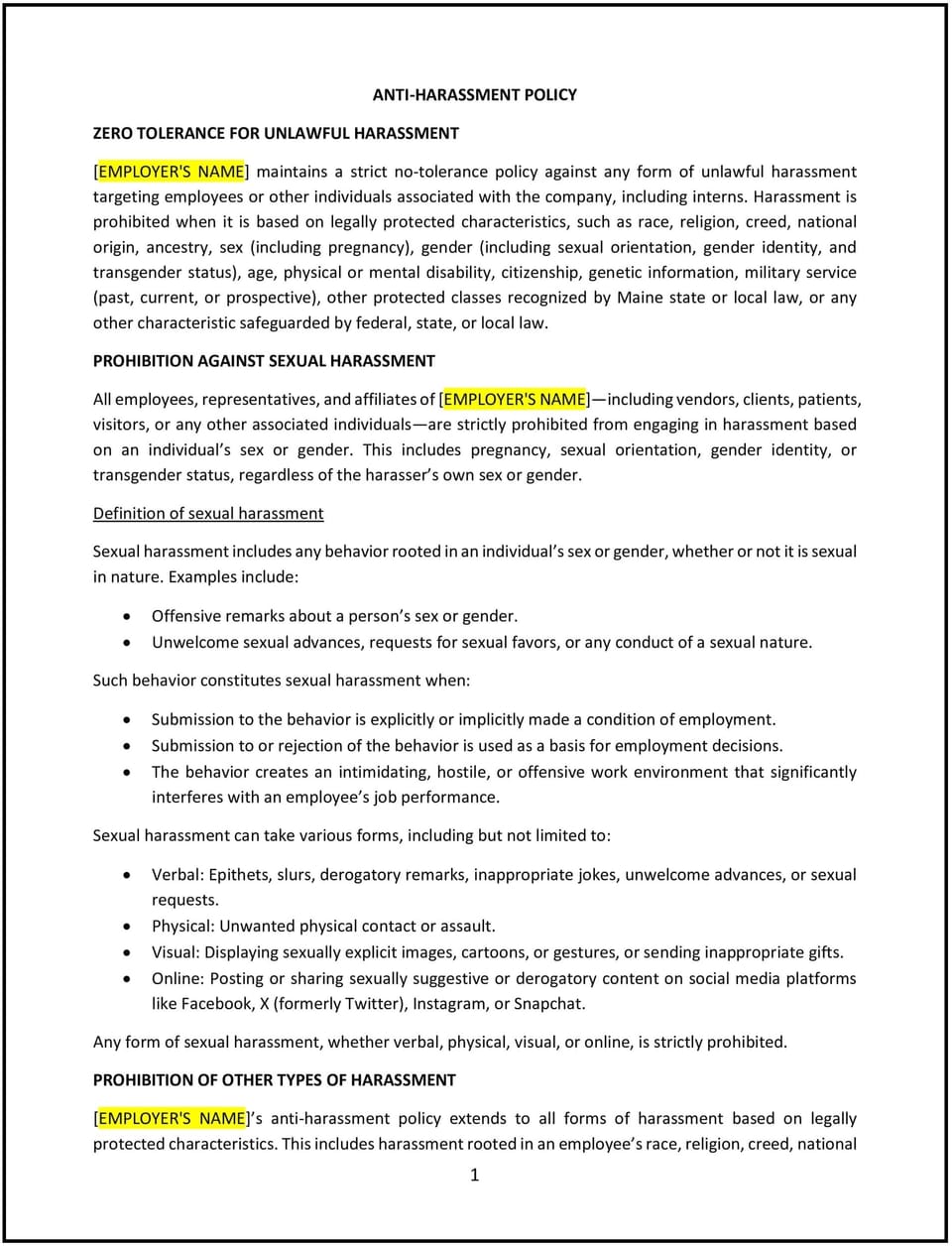Anti-harassment policy (Maine): Free template

Anti-harassment policy (Maine): Free template
This anti-harassment policy is designed to help Maine businesses create a safe and respectful workplace by addressing and preventing harassment in all forms. It establishes clear guidelines for identifying, reporting, and resolving harassment incidents to promote a supportive work environment for all employees.
By implementing this policy, Maine businesses can foster a culture of respect, reduce workplace conflicts, and support compliance with state and federal harassment laws.
How to use this anti-harassment policy (Maine)
- Define harassment: Clearly outline what constitutes harassment, including examples of prohibited behaviors such as verbal, physical, or visual harassment.
- Establish reporting procedures: Provide detailed steps for employees to report incidents of harassment, including confidential reporting options.
- Designate points of contact: Specify who employees should contact for support or to report concerns, such as HR personnel or designated managers.
- Ensure investigation protocols: Outline the process for investigating reported incidents, including timelines and confidentiality measures.
- Prohibit retaliation: Include a clear statement that employees who report harassment or participate in investigations will not face retaliation.
- Provide training: Require regular training for employees and managers on recognizing and preventing harassment.
- Promote accountability: Detail the consequences for engaging in harassment, which may include disciplinary actions up to termination.
- Review regularly: Update the policy to reflect changes in Maine laws or workplace practices.
Benefits of using this anti-harassment policy (Maine)
Implementing this policy provides several benefits for Maine businesses:
- Promotes a safe workplace: Helps prevent harassment and creates a positive work environment.
- Supports legal compliance: Aligns with Maine and federal anti-harassment laws to reduce legal risks.
- Enhances employee morale: Demonstrates a commitment to respect and fairness, improving employee satisfaction.
- Encourages reporting: Establishes clear procedures that empower employees to address concerns confidently.
- Protects the business: Reduces the risk of costly disputes or reputational damage resulting from harassment claims.
Tips for using this anti-harassment policy (Maine)
- Communicate the policy: Share the policy with employees during onboarding and ensure it is included in the employee handbook.
- Provide manager training: Equip managers with the tools to identify and address harassment effectively.
- Monitor compliance: Regularly review workplace practices to ensure adherence to the policy.
- Maintain confidentiality: Protect the privacy of all parties involved in harassment reports and investigations.
- Foster open dialogue: Encourage employees to discuss concerns and ask questions about the policy.
- Stay updated: Monitor changes in Maine’s anti-harassment laws to ensure the policy remains current.
Q: What types of behavior are considered harassment?
A: Harassment includes unwelcome verbal, physical, or visual conduct that creates a hostile or offensive work environment, such as inappropriate jokes, threats, or physical intimidation.
Q: How can employees report harassment?
A: Employees can report harassment by following the procedures outlined in the policy, which include contacting HR or a designated manager.
Q: Will reports of harassment remain confidential?
A: Reports will be handled confidentially to the extent possible, with information shared only as necessary to investigate and resolve the issue.
Q: What protections are in place for employees who report harassment?
A: Employees who report harassment or participate in investigations are protected from retaliation under this policy.
Q: What happens after a harassment report is filed?
A: Businesses should conduct a prompt and impartial investigation, take appropriate action, and communicate the resolution to the affected parties.
Q: Are managers required to take training on harassment prevention?
A: Yes, all managers must complete regular training to understand their responsibilities in preventing and addressing harassment.
Q: How often should this policy be reviewed?
A: The policy should be reviewed annually or whenever there are changes in Maine laws or workplace operations.
This article contains general legal information and does not contain legal advice. Cobrief is not a law firm or a substitute for an attorney or law firm. The law is complex and changes often. For legal advice, please ask a lawyer.


